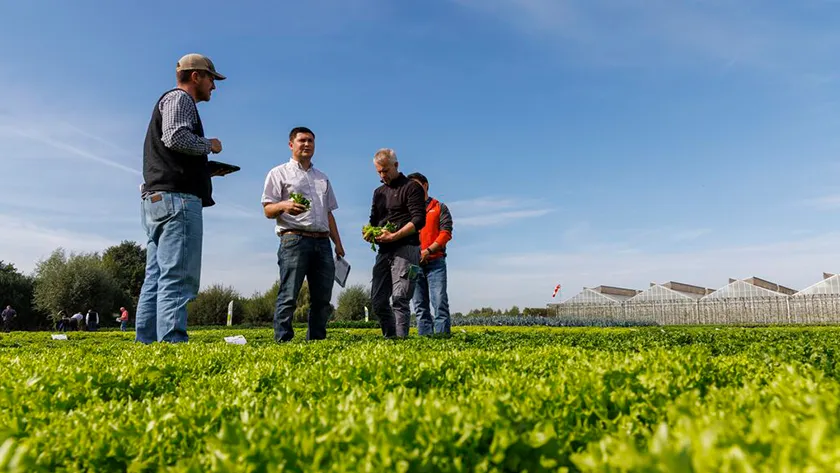The Netherlands
July 1, 2024
On 1 July, the European committee of the International Bremia Evaluation Board (IBEB-EU) published the denomination of a widely occurring new race of downy mildew in lettuce: Bl:41EU.
New officially denominated race
Downy mildew can affect lettuce leaves in both protected and open-field crops, resulting in a loss of yield. A new variant of downy mildew (Bremia lactucae or Bl) has been found across Europe. This race has received the denomination BI:41EU.
IBEB-EU expects BI:41EU to continue to spread in the summer and autumn of this year, although it is currently difficult to predict the extent of the impact in specific areas. Rijk Zwaan’s crop specialists are happy to advise growers with detailed information about the company’s range of lettuce varieties and their resistances.
 Over 500 lettuce varieties have been developed at Rijk Zwaan’s research and breeding station in the Netherlands, tailored to diverse growing methods and environmental conditions.
Over 500 lettuce varieties have been developed at Rijk Zwaan’s research and breeding station in the Netherlands, tailored to diverse growing methods and environmental conditions.
Sustainable solutions
Rijk Zwaan strongly advocates for integrated pest and disease management to minimise the risk of plant disease outbreaks. While resistant varieties play a crucial role, the company also recommends the restrained use of appropriate crop protection agents to prevent the development of new downy mildew variants. Furthermore, the implementation of good hygiene practices, such as removing diseased crops and promptly ploughing in crop residues, can help reduce the spread of downy mildew in lettuce.
International Bremia Evaluation Board
The International Bremia Evaluation Board (IBEB) is a joint initiative of lettuce breeding companies in the USA, France and the Netherlands, as well as the USA’s University of California-Davis, the Netherlands’ Inspection Service for Horticulture (Naktuinbouw) and the French National Seed Station (GEVES). IBEB’s mission is to identify new races of Bremia lactucae that pose a significant threat to North American or European lettuce production and to promote the use of standardised race names in communication with growers.
Races are identified and nominated by regional IBEB committees specifically for each continent. For more information, visit the International Seed Federation’s website.
Benennung einer neuen offiziellen Rasse von Falschem in Salat
Am 1. Juli hat der europäische Ausschuss des International Bremia Evaluation Board (IBEB-EU) die Bezeichnung einer weit verbreiteten neuen Rasse des Falschen Mehltaus bei Salat veröffentlicht: Bl:41EU.
Neue, offiziell benannte Rasse
Falscher Mehltau kann Salat sowohl in geschützten Anbau als auch Freilandkulturen befallen und zu Ertragseinbußen führen. Eine neue Variante des Falschen Mehltaus (Bremia lactucae oder Bl) wurde in ganz Europa gefunden. Diese Rasse hat die Bezeichnung BI:41EU erhalten.
IBEB-EU geht davon aus, dass sich BI:41EU im Sommer und Herbst dieses Jahres weiter ausbreiten wird, obwohl es derzeit schwierig ist, das Ausmaß der Auswirkungen in bestimmten Gebieten vorherzusagen. Die Anbauspezialisten von Rijk Zwaan beraten die Anbauer gerne mit detaillierten Informationen über die verschiedenen Salatsorten des Unternehmens und ihre Resistenzen.
Nachhaltige Lösungen
Rijk Zwaan setzt sich nachdrücklich für eine integrierte Schädlings- und Krankheitsbekämpfung ein, um das Risiko des Ausbruchs von Pflanzenkrankheiten zu minimieren. Während resistente Sorten eine entscheidende Rolle spielen, empfiehlt das Unternehmen auch den zurückhaltenden Einsatz geeigneter Pflanzenschutzmittel, um die Entwicklung neuer Varianten des Falschen Mehltaus zu verhindern. Darüber hinaus kann die Anwendung guter Hygienepraktiken, wie das Entfernen kranker Pflanzen und das unverzügliche Unterpflügen von Ernterückständen, dazu beitragen, die Ausbreitung des Falschen Mehltaus bei Salat zu verringern.
Internationaler Ausschuss für die Bewertung von Bremia
Das International Bremia Evaluation Board (IBEB) ist eine gemeinsame Initiative von Salatzuchtunternehmen in den USA, Frankreich und den Niederlanden sowie der University of California-Davis in den USA, dem niederländischen Inspektionsdienst für den Gartenbau (Naktuinbouw) und der französischen Nationalen Saatgutstation (GEVES). Die Aufgabe des IBEB besteht darin, neue Rassen von Bremia lactucae zu identifizieren, die eine erhebliche Bedrohung für die nordamerikanische oder europäische Salatproduktion darstellen, und die Verwendung von standardisierten Rassenbezeichnungen in der Kommunikation mit den Erzeugern zu fördern.
Die Rassen werden von regionalen IBEB-Ausschüssen speziell für jeden Kontinent identifiziert und nominiert. Weitere Informationen finden Sie auf der Website des Internationalen Saatgutverbandes. Weitere Informationen finden Sie auf der Website des Internationalen Saatgutverbandes.
Unseren resistenten Salatsorten auf einen Blick.